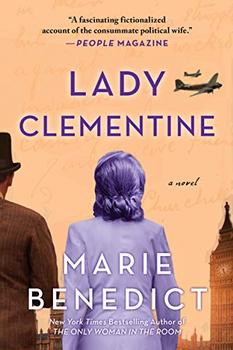Summary | Excerpt | Reading Guide | Reviews | Beyond the Book | Readalikes | Genres & Themes | Author Bio

Mother doesn't answer at first, unused to being challenged. Finally, she speaks, in a forced and deliberate manner. "Of course not, Clementine. But I will arrange for a brougham to pick you up and take you back to prepare at Lady St. Helier's within the hour. After all, there will be over a thousand people watching you arrive at St. Margaret's church to walk down the aisle."
CHAPTER THREE
September 12, 1908
London, England
An hour passes on the mantelpiece clock, and I am still submitting to the ministrations of Lady St. Helier's personal maid. As she tends to my hair, coaxing its heavy chestnut strands into an elaborate pompadour, I examine my face in the mirror. My almond-shaped eyes and profile, often described by others as Roman or well chiseled, whatever that means, appear the same as they do every day. Yet this day is unlike any other.
I watch the minutes tick by on the clock, almost incredulous that most women of my acquaintance spend a significant portion of their days in some version of this process. They waste hours while their maids assist them in changing from one outfit into another, from one coiffure to another, as they move from one social occasion to the next. Mother's peripatetic, often penurious, lifestyle meant that I'd performed all the maids' chores myself on those instances when I was invited to an event requiring intricate updos and formal attire, but more often than not, I wore a simple tie-and-shirt-collar blouson, a skirt, and a basic hairstyle. I know now that even if my future life as Mrs. Winston Churchill allows for an abundance of personal maids, I do not want my time spent in this frivolous manner.
A glint of sunlight reflects off the large ruby at the center of my engagement ring. I wiggle my fingers, making the light catch and dance on the facets of the ruby and the diamonds that flank it, and recollect Winston's proposal. In the mirror, I see a smile curving on my lips at the memory."
x
By midsummer, the invitations to visit Winston at Blenheim Palace, one of England's largest houses and the only nonroyal home to have the designation of palace, began pouring into our home in Abingdon Villas. Blenheim was owned by Winston's cousin and close friend, the Duke of Marlborough, who went by the name "Sunny" after one of his titles, the Earl of Sunderland, and Winston was spending part of the summer there. I demurred at first, not out of reluctance to see him but out of despair that I did not own the proper gowns required for such a grand occasion.
His invitations continued until I could not refuse without rebuffing the man to whom I'd grown unexpectedly attached. Letters and visits with Winston over the preceding four months had revealed him to be wonderful company, not at all the brusque pundit that the newspapers labeled him. In the long missives he penned to me during a trip undertaken with my mother to Germany to fetch Nellie back from a tuberculosis cure, he brimmed with the sort of enthusiasm and idealism that I, too, had about politics, history, and culture. In his company, I felt drawn into the thick of things, as if I was becoming an essential cog in the core of England.
I felt another kinship with him as well, a sense of aloneness in the world. We had both been raised by unconventional, unaffectionate mothers: mine, who'd entered into an unhappy union with Colonel Henry Hozier before engaging in perhaps happier affairs with several men who fathered her four children before their divorce, leaving the caretaking of us to servants; and his, the exquisite American-born heiress Lady Randolph Churchill, née Jennie Jerome, whose number of affairs rivaled that of Mother and who'd left the raising of Winston and his younger brother to their beloved Nanny Everest. Our fathers, if indeed my mother's former husband could be called my father, given his uncertain parentage and our very few encounters in the years after the divorce, played even lesser roles than our mothers; it seems that Lord Randolph, in particular, actively disliked his elder son and, during their limited time together, would spend it critiquing him. Winston and I had been left in an uncertain state about our place in society and in relationships. But, to our delight and surprise, that sensation disappeared when we were together.
Excerpted from Lady Clementine by Marie Benedict. Copyright © 2020 by Marie Benedict. Excerpted by permission of Sourcebooks. All rights reserved. No part of this excerpt may be reproduced or reprinted without permission in writing from the publisher.
Your guide toexceptional books
BookBrowse seeks out and recommends the best in contemporary fiction and nonfiction—books that not only engage and entertain but also deepen our understanding of ourselves and the world around us.